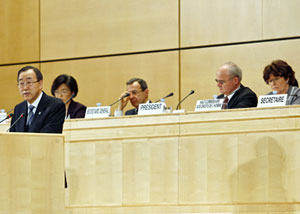
NEW YORK (IPS/GIN) – At least 14 Middle East and North African governments are systematically violating the civil liberties of their citizens, according to one of the most widely respected Arab nongovernmental organizations.
In a March report to the United Nations Human Rights Council, the Cairo Institute for Human Rights Studies said there have been “huge harassments of human rights organizations, and defenders have been increasingly subject to abusive and suppressive actions by government actors … in the majority of Arab countries, particularly Egypt, Syria, Bahrain and Tunisia.”
Most of the governments under scrutiny are close U.S. allies in the war on terror.
The group called upon the international community to “exert effective efforts to urge Arab governments to duly reconsider their legislation, policy and practices contravening their international obligations to protect freedom of assembly, freedom of expression and freedom to form associations, including nongovernmental organizations.”
It added that “Special attention should be awarded to providing protection to human rights defenders in the Arab World.”
As an example of typical area-wide human rights abuses, the report cited the recent forced closure by Egyptian authorities of the Association for Human Rights Legal Aid, an organization active in exposing incidences of torture. The Egyptian government claimed that the organization “received foreign funding without having the consent of the Minister of Social Solidarity.”
The organization warned of “increasingly repressive conditions” being imposed on nongovernmental organizations in Egypt, including a proposed amendment to the Law of Associations that it said would limit the right of association and expression.
Other Arab nations singled out for detailed criticism were Algeria, Bahrain, Iraq, Jordan, Libya, Morocco, Saudi Arabia, Syria, Sudan, Somalia, Tunisia, the United Arab Emirates and Yemen. The report also accused four other Arab countries–Libya, Algeria, Sudan and Morocco–of human rights abuses.
The U.S. and other Western governments have had close ties with Arab governments in the Middle East and North Africa for many years. These ties have grown closer since the terrorist attacks on the U.S. on Sept. 11, 2001.
But since the administration of President Ronald Reagan, promoting democracy and freedom in the Arab world has been a staple in U.S. political rhetoric. The rhetoric has ratcheted up significantly during the administration of President George W. Bush.
Bush administration officials say they have used diplomatic pressure, foreign aid and the architecture established by Mr. Reagan to help nurture democracy in the Middle East and North Africa. President Bush also said the democratic transformation of the Middle East would begin with regime change in Iraq.
Many observers have found the Bush administration’s relationships with Egypt to be particularly problematic. In the past, the president and his secretary of state, Condoleezza Rice, have publicly expressed criticism of Egypt for repressing free political opposition. Egypt notably imprisoned liberal reformers such as Ayman Nour, the principal political opponent of longtime President Hosni Mubarak.
Earlier this year, the U.S. Congress put a hold on $100 million of military aid to Egypt, calling on the Mubarak government to protect the independence of the judiciary, stop police abuses and curtail arms smuggling from Egypt to Gaza. In a testimony to Congress, Margaret Scobey, the nominee to be ambassador to Egypt, said, “The government’s respect for human rights remains poor, and serious abuses continue.”
But in January, the U.S. waived the hold in a bid to encourage Egypt to help in calming the Israeli-Palestinian crises. In a visit to Egypt the same month, President Bush told his Egyptian counterpart, “I appreciate the example that your nation is setting.”
Egypt receives $2 billion a year, including $1.3 billion in military assistance from the U.S. annually–second only to the sum awarded to Israel.
Steve Carpinelli of the Center for Public Integrity said, “Billions of dollars in new military aid, accompanied by lax oversight and poor accountability, have flowed to governments with documented histories of human rights abuses (and) weak advancements toward democratic governance and the rule of law.”
Mr. Carpinelli said these were among the findings of the center’s Collateral Damage project, which assessed the impact of U.S. military aid in the post-Sept. 11 era.
The Center for Public Integrity, a government accountability watchdog group, has recently published a comprehensive report on U.S. military aid to repressive governments. The full report can be found at http://www.publicintegrity.org/MilitaryAid/.
The Cairo Institute for Human Rights Studies’ report to the UN detailed numerous human rights violations throughout the Arab Middle East and North Africa. It accused Syria of arresting many “qualified professionals personnel belonging to human rights organizations and civil society revival committees.” It also said the Bahraini government closed the Bahrain Center for Human Rights, put the president of one civil society on trial, and charged seven other activists with “participating in an illegal gathering and creating disturbance.”
“Furthermore, civil society institutions in conflict affected countries, such as Iraq, come under constant violent attack; the same applies to the situation in Palestine–whether due to the occupation or infighting between its two political parties,” the report said.












